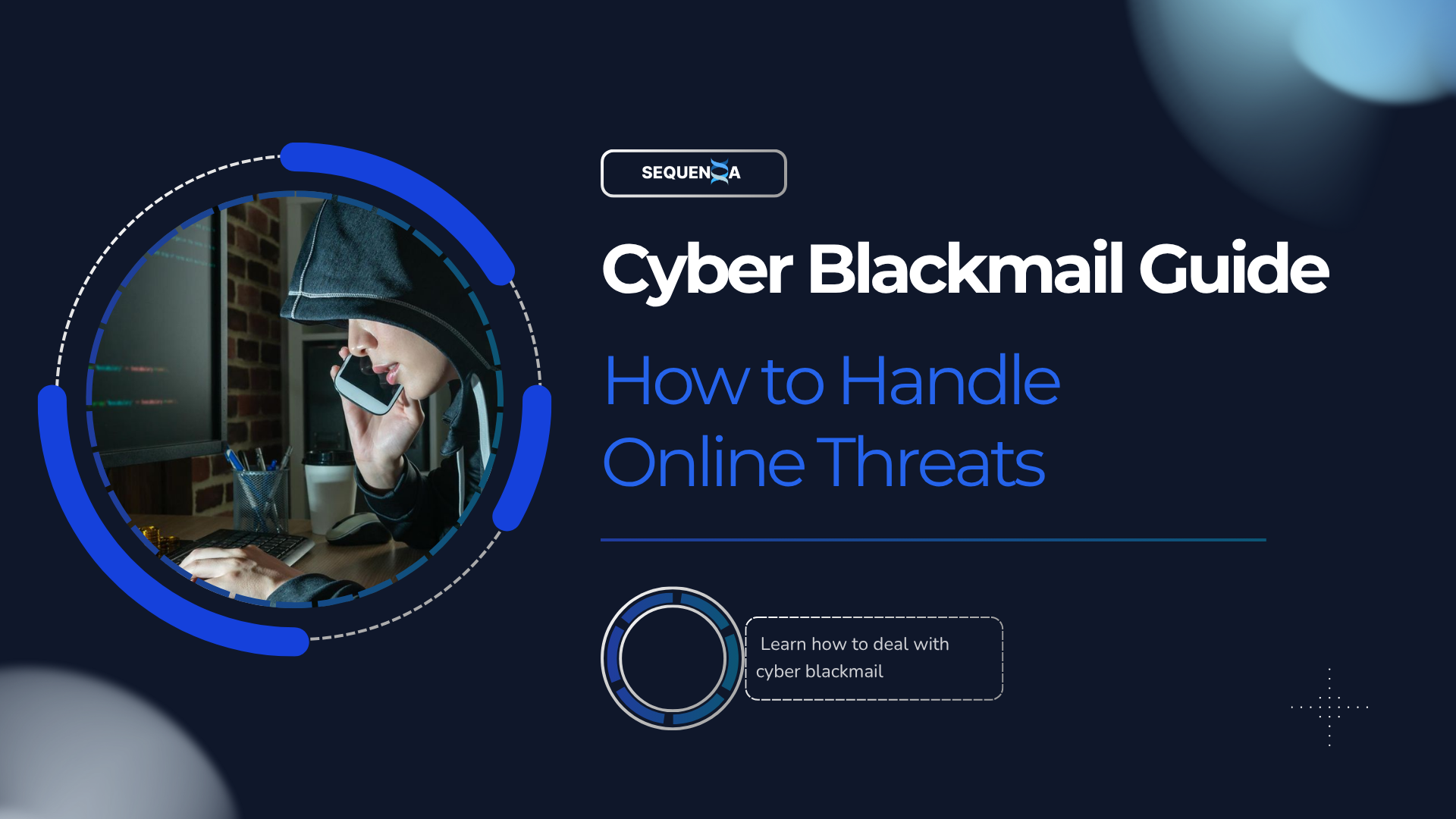Cyber Blackmail Guide: How to Handle Online Threats

Cyber blackmail is a fast-growing cybercrime where malicious actors use personal or sensitive data, gathered through hacking, phishing, or social engineering, to extort money, services, or silence from their victims. It affects individuals and businesses alike, leaving victims confused, fearful, and unsure where to turn.
This guide breaks down what cyber blackmail looks like, how to deal with cyber blackmail effectively, where to get online blackmail help, and who to call if being blackmailed. You’ll also learn about critical tools and services, including those from Sequenxa, that detect and stop these threats before they can escalate.
What Is Cyber Blackmail and How It Happens
Cyber blackmail refers to the act of threatening someone using stolen, fabricated, or compromising content to force them into submission, usually for money or influence. It commonly appears as internet blackmail, sextortion, or threats to leak private conversations, media, or financial data.
Tactics cybercriminals use:
Email phishing scams to collect passwords or sensitive info
Sextortion scams via fake relationships or hacked devices
Cloud account breaches with ransomware or malware
Impersonation attacks using deepfakes or social media hijacking
Example:A freelance designer was extorted after a hacker accessed his Dropbox containing client contracts. The attacker demanded $5,000 or threatened to leak confidential work agreements. Legal help and digital forensics assistance stopped the attack and traced the source.
“Threat actors rarely start big, they test your fear first. Watch for patterns, even subtle ones.”
Warning Signs You’re Being Targeted
Recognizing the warning signs of cyber blackmail is the first step toward avoiding long-term damage. Many victims miss these early red flags, allowing attackers to gain more leverage.
Look out for:
Unusual emails referencing your private info
Threatening messages containing leaked photos or files
Login alerts from unfamiliar devices
Mentions of your email or passwords on breach tracking tools
Don’t underestimate “small threats.” They often evolve into major cyber blackmail attempts over time.
Did you know? 67% of internet blackmail victims said they initially ignored early warning signs (CyberEdge Group, 2023).
Are you confident that no personal information about you has been leaked online?
Immediate Steps: How to Deal with Cyber Blackmail
If you're under threat, every second counts. Here's how to deal with cyber blackmail in a calm and effective way.
Action plan:
Do not panic or pay. Payment invites repeat extortion.
Take screenshots and save messages as evidence.
Lock down accounts, change passwords and enable multi-factor authentication.
Get online blackmail help from cybersecurity experts.
Contact a cybercrime helpline no or the cyber security helpline in your country.
If you're unsure what to do if someone is threatening you online, start by preserving every bit of communication and avoid direct engagement.
Need real help fast? Sequenxa helps prevent blackmail by detecting threats before they turn into attacks.
Who to Call if Being Blackmailed: Trusted Helplines
Acting quickly can reduce or even eliminate the consequences of cyber blackmail. The sooner you reach out for help, the better your outcome.
Where to get help:
Cybercrime Helpline No (India): Call 1930
FBI Internet Crime Center (USA): ic3.gov
Cyber Security Helpline (UK): 0300 123 2040
Blackmail Hotline (Various NGOs): Search local NGOs for confidential help
Even if you think your issue is “small,” reporting it creates digital evidence for future legal protection.
Did you know? Reporting to a cyber security number within 24 hours reduces damage recovery time by 78% (McAfee, 2023).
Do you have national or local cybersecurity numbers saved in your phone?
Online Blackmail Help: Legal and Psychological Support
Online blackmail can be mentally and emotionally exhausting. It creates a cycle of fear and secrecy. Getting professional help empowers victims to regain control.
Support includes:
Lawyers who can send takedown notices and press charges
Counseling services for trauma and emotional recovery
Digital privacy specialists for ongoing protection
Blackmail helplines that provide anonymous, step-by-step support
Whether it’s sextortion or internet blackmail, speaking to a neutral professional is often the turning point.
“Shame has no place in digital abuse, only solutions do”
Would you know how to comfort or guide someone being blackmailed online?
Where to Report Sextortion and Cyber Threats
Sextortion is a serious form of cyber blackmail that targets personal vulnerability. Reporting these crimes is vital not just for your protection, but for helping prevent others from being targeted.
Reporting options include:
Report Sextortion Online via in-app features on Instagram, Facebook, or TikTok
Local police or cybercrime departments
Blackmail hotline support groups in your region
Many victims don't report due to fear or embarrassment. Reporting makes you part of the solution.
“Every report chips away at the power these criminals hold. Report for yourself, and for others.”
Worried about leaks? Sequenxa monitors digital exposure so you’re not caught off guard.
Prevention Tips: Staying Ahead of Cyber Blackmail
Protecting yourself before the threat arises is the best defense against online blackmail. A few smart habits can reduce your risk dramatically.
Proactive steps to take:
Enable 2FA on all accounts
Avoid sharing private content digitally, even in trusted circles
Monitor your digital presence with breach alert tools
Use password managers to avoid reusing login details
Subscribe to monitoring tools like those offered by Sequenxa to detect leaks early
Did you know? 80% of cyber blackmail cases stem from old, reused passwords (Verizon DBIR, 2023).
“Digital hygiene is no longer optional, it’s your front line of defense.”
FAQs
What to do if someone is threatening you online?
Remain calm. Save all evidence and immediately contact a cybercrime helpline no or blackmail helpline.
Who to call if being blackmailed via email or social media?
Reach out to the cyber security helpline in your country, or file a report with national authorities.
Where to report sextortion involving private images or videos?
Report sextortion online via platform abuse tools.
How do I get online blackmail help anonymously?
Many blackmail helpline services and nonprofits offer anonymous support and advice.
Can cyber blackmail help services prevent future attacks?
Yes, tools like Sequenxa identify early leaks and vulnerabilities to prevent blackmail before it starts.
Stop Blackmail Before It Ever Starts
Cyber blackmail is ruthless, but it’s preventable. From sextortion threats to internet blackmail, the right tools, knowledge, and support can protect your data and your peace of mind.
Want to prevent cyber blackmail before it starts? Sequenxa helps by identifying leaked info early, stopping threats at the source.
References
CyberEdge Group. (2023). Cybersecurity Trends Report. Retrieved from https://cyber-edge.com
McAfee. (2023). Hidden Costs of Cybercrime. Retrieved from https://www.mcafee.com
Verizon. (2023). Data Breach Investigations Report. Retrieved from https://www.verizon.com/dbir
Norton LifeLock. (2023). Online Threat Research. Retrieved from https://www.nortonlifelock.com
Have I Been Pwned. (2023). Breach Monitoring Stats. Retrieved from https://haveibeenpwned.com



